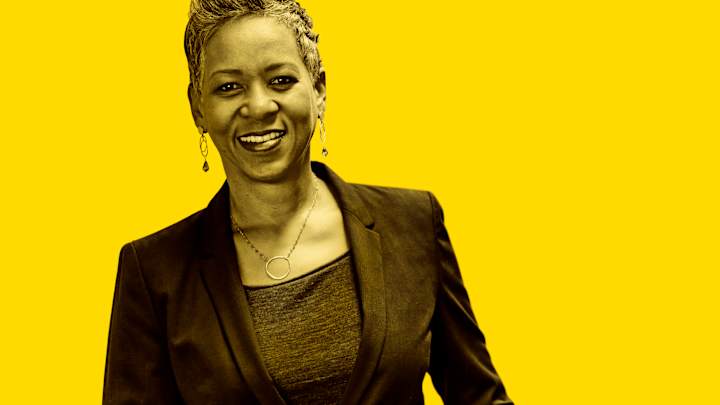Former USTA President Katrina Adams Continues to Inspire

Sports Illustrated and Empower Onyx are putting the spotlight on the diverse journeys of Black women across sports—from the veteran athletes, to up-and-coming stars, coaches, executives and more—in the series, Elle-evate: 100 Influential Black Women in Sports.
The only girl and the youngest of three siblings in her family, Katrina Adams grew up on the West Side of Chicago on a close-knit block, during a time in the 1980s when gangs were on the rise.
“I think we lived between the Vice Lords and the Disciples,” says Adams, 53. “So, I was pretty sheltered, and was driven to school until I was probably a junior in high school.”
Sports were a part of her life as far back as she can remember. Her father was a fanatic who watched football, basketball, and baseball every weekend, and she played a variety of sports with her family—but not tennis. At least not until she was introduced to the game at the age of six. “It was kind of something that I really loved from the first time I hit the ball,” she says.
Fast forward to today, and Adams has checked off nearly every role in the world of tennis, from a young player in an inner-city program, to the pro level, to national coach, to commentator, all the way to the C-suite. After competing for 12 years on the WTA Tour, earning 20 career doubles titles, Adams eventually became president, chairman and CEO of the United States Tennis Association for two consecutive terms from 2015 to '18.
Adams calls her trailblazing career path unconventional, and it’s true—she’s the first former pro tennis player to head up the USTA and the only Black woman to ever serve in that role in the organization’s history. It’s quite the contrast to the start of her journey, where she was teased for being the poster child of sport because she became a notable product of the USTA’s grassroots programs across the country. “Every summer they had a different activity,” says Adams of Chicago’s Dr. Martin Luther King Boys & Girls Club. “That summer was tennis.”
A couple of instructors saw potential in her, and soon she was taking private lessons and participating in another indoor program on the weekends at Washington Park in Chicago. “It was on a basketball court with a bunch of lines for basketball, tennis, volleyball—you name it, every line was down there,” she says. As Adams crafted her game, she joined more advanced programs where she could compete against older athletes. “I was beating the big kids. I was very competitive from a very young age,” she says.
Adams didn’t need sports to boost her self-esteem. She likes to say that she was “born this way,” brimming with confidence. “I was an extrovert,” she says. “I always knew everything, and I told you that I knew everything.” Her assertiveness bolstered her to new heights in tennis—she went on to play at Northwestern University, where she won the NCAA doubles title with Diane Donnelly in 1987, before turning pro.
“I needed all that confidence to be able to go out there to compete,” she says. “The more I played, the more confident I got, not only as a tennis player, but also in myself and my abilities to be able to go out on a limb and try something that was out of the ordinary, for my community. And then excel at it and be good at it.”
During her coaching career, she worked with some of the high-performing junior players who were making the transition to the pros. After four and a half years or so, Adams made the jump to the booth, working as an analyst for Tennis Channel. Then she became the executive director of the Harlem Junior Tennis and Education Program, which is part of the National Junior Tennis and Learning Network, co-founded by Arthur Ashe in 1969.
“Our program started in 1972,” says Adams, who never envisioned herself as a sports exec. “I started when I was 35 years old, and I'm still there today, loving every minute of it. We'll be celebrating our 50th anniversary next year.”
Adams says that the Harlem program is where she really learned how to run a business. From the financials, to the legalese, to collaborating with board members, it all prepared her for her role at the USTA. Her leadership has flowed from the court to the business world, and her innovation and creativity are a result, she says, of her parents pouring into her at a young age.
“I started to hone [my skills] and brought them with me into the next chapter,” she says. “Being tactical, as they call it in sport, or changing your strategy, collaborating and communicating are all ways of being creative.”
Today, volunteering keeps Adams busy. She is the vice president of the International Tennis Federation, which is based in London; the chair of the Gender Equality and Tennis Committee; and the chair of the Billie Jean King Cup committee, formerly known as Fed Cup.
“I juggle a lot of different departments,” she says. “And I do it all because I love it.”
Bryna Jean-Marie is a contributor for Empower Onyx, a diverse multi-channel platform celebrating the stories and transformative power of sports for Black women and girls.

Bryna Jean-Marie is a contributor for Empower Onyx, a diverse multi-channel platform celebrating the stories and transformative power of sports for Black women and girls.